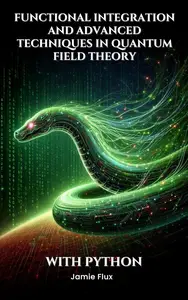
Free Download Functional Integration and Advanced Techniques in Quantum Field Theory (Mathematical Foundations of Quantum Field Theory) by Jamie Flux
English | September 15, 2024 | ISBN: N/A | ASIN: B0DH48NZH6 | 410 pages | PDF | 1.58 Mb
This volume provides a rigorous mathematical treatment of functional integration methods in quantum field theory. Beginning with the foundations of measure theory and functional analysis, it explores path integrals, Wiener and Feynman measures, and their applications to quantization. Topics include the properties of functional spaces, advanced techniques in evaluating path integrals, and the role of zeta function regularization. This book is essential for graduate students and researchers seeking a deep understanding of the mathematical structures underlying functional integration in quantum fields.
Key Features:
– Comprehensive coverage of functional integration from foundational principles to advanced applications.
– In-depth exploration of path integrals, Gaussian measures, and their mathematical underpinnings.
– Insightful connections between measure theory, functional analysis, and quantum mechanics.
– Step-by-step Python code examples that implement theoretical concepts from each chapter.
– Detailed examination of renormalization techniques, zeta function regularization, and more.
What You Will Learn:
– Construct and analyze measures in infinite-dimensional spaces.
– Navigate the foundational concepts of functional analysis, focusing on relevant spaces and operators.
– Understand the path integral formulation of quantum mechanics and its applications.
– Analyze the Wiener measure and relate it to Brownian motion in quantum contexts.
– Develop a comprehensive understanding of Feynman path integrals and the Feynman-Kac formula.
– Investigate properties and structures of Hilbert and Banach spaces pivotal in quantum field theory.
– Explore Gaussian measures and their essential role in calculating path integrals.
– Apply the Cameron-Martin theorem to modify path integrals and assess their implications.
– Integrate Fréchet spaces and distributions in handling quantum field theory challenges.
– Compare Lagrangian and Hamiltonian formulations and their impact on functional integrals.
– Review renormalization methods and complex regularization techniques.
– Delve into BPHZ renormalization and its mathematical infrastructure.
– Utilize zeta function regularization to manage divergences in functional integrals.
– Formulate Dyson-Schwinger equations for quantum field evaluations.
– Calculate functional determinants using techniques like heat kernels.
– Grasp the significance of Wightman axioms within the path integral framework.
– Examine the renormalization group and flow equations to understand scale-dependent behaviors.
– Implement BRST symmetry in path integral quantization for gauge theories.
– Explore topological quantum field theories through the lens of path integrals.
– Apply stochastic quantization methods to path integrals for novel quantization approaches.
– Investigate asymptotic freedom in quantum field theories via path integration techniques.
– Integrate supersymmetry within the path integral approach for quantitative analysis.
– Address the quantization of non-Abelian gauge theories and their inherent challenges.
– Study the role of instantons and solitons in non-perturbative path integral formulations.
– Analyze renormalons and resolve infrared issues in field theories.
– Implement the Faddeev-Popov procedure for gauge symmetry management in integrations.
– Incorporate Grassmann algebra into fermionic path integral frameworks.
– Explore Yang-Mills theory through functional integration and gauge invariance concepts.
– Utilize lattice field theory as a computationally viable approach to functional integration challenges.
– Examine anomalies, their mathematical foundations, and physical implications within path integrals.
– Evaluate the significance of Chern-Simons theories through path integral methods.










Leave a Reply
You must be logged in to post a comment.